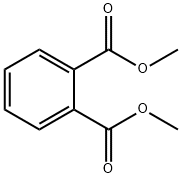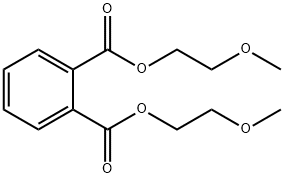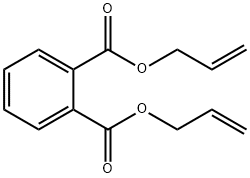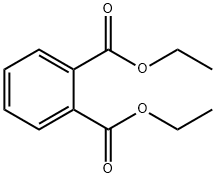A3251112
Dimethyl Phthalate Acid Ester in Methanol Certified Reference Material , 230.0 μg/ml, solvent: methanol , 131-11-3
Synonym(s):
Dimethyl phthalate;DMP;Phthalic acid dimethyl ester
CAS NO.:131-11-3
Empirical Formula: C10H10O4
Molecular Weight: 194.18
MDL number: MFCD00008425
EINECS: 205-011-6
| Pack Size | Price | Stock | Quantity |
| 1.2ml | RMB164.00 | In Stock |
|
| 2ML | RMB220.80 | In Stock |
|
| others | Enquire |
Update time: 2022-07-08
PRODUCT Properties
| Melting point: | 2 °C (lit.) |
| Boiling point: | 282 °C (lit.) |
| Density | 1.19 g/mL at 25 °C (lit.) |
| vapor pressure | 0.008 hPa (20 °C) |
| refractive index | n |
| Flash point: | 295 °F |
| storage temp. | Store below +30°C. |
| solubility | 4.0g/l |
| form | Liquid |
| Specific Gravity | 1.194 (20/4℃) |
| color | Clear |
| Relative polarity | 0.309 |
| PH | 7 (H2O, 20℃) |
| Odor | sl. aromatic odor |
| biological source | synthetic |
| Water Solubility | <0.1 g/100 mL at 20 ºC |
| Merck | 14,3255 |
| BRN | 1911460 |
| Henry's Law Constant | At 25 °C: 235, 246, 230, 214, 168, 127, and 118 at pH values of 3.00, 3.37, 5.88, 6.18, 7.62, 8.91,
and 8.99, respectively (Hakuta et al., 1977). |
| Dielectric constant | 8.1(45℃) |
| Exposure limits | TLV-TWA air 5 mg/m3 (ACGIH, MSHA,
and OSHA). |
| Stability: | Stable. Combustible. Incompatible with strong oxidizing agents, strong acids, strong bases, nitrates. Sensitive to prolonged exposure to light. |
| InChIKey | NIQCNGHVCWTJSM-UHFFFAOYSA-N |
| LogP | 1.54 at 25℃ |
| CAS DataBase Reference | 131-11-3(CAS DataBase Reference) |
| NIST Chemistry Reference | Dimethyl phthalate(131-11-3) |
| EPA Substance Registry System | Dimethyl phthalate (131-11-3) |
Description and Uses
Dimethyl phthalate (DMP) is a member of the group of esters of phthalic acid commonly known as phthalates, used ubiquitously as solvents and plasticisers worldwide. Phthalates are plasticizers, and increase the flexibility of plastics. They are also found in deodorant formulations, perfumes, emollients and insect repellents.
Dimethyl Phalate is the methyl ester of phthalic acid. Dimethyl phthalate is an ectoparasiticide and has many other uses, including in solid rocket propellants, plastics, and insect repellents.
Safety
| Symbol(GHS) |    GHS02,GHS06,GHS08 |
| Signal word | Danger |
| Hazard statements | H225-H301+H311+H331-H370 |
| Precautionary statements | P210-P260-P280-P301+P310-P311 |
| Hazard Codes | F,T |
| Risk Statements | 20/21/22-36/37/38-39/23/24/25-23/24/25-11-52 |
| Safety Statements | 24/25-45-36/37-16-7 |
| RIDADR | UN 3082 |
| OEB | B |
| OEL | TWA: 5 mg/m3 |
| WGK Germany | 1 |
| RTECS | TI1575000 |
| Autoignition Temperature | 460 °C DIN 51794 |
| TSCA | Yes |
| HS Code | 2917 34 00 |
| Hazardous Substances Data | 131-11-3(Hazardous Substances Data) |
| Toxicity | LD50 in mice, rats, guinea pigs (ml/kg): 7.2, 6.9, 2.4 orally (Draize) |
| IDLA | 2,000 mg/m3 |
| 発がん性評価について | EPA D |




